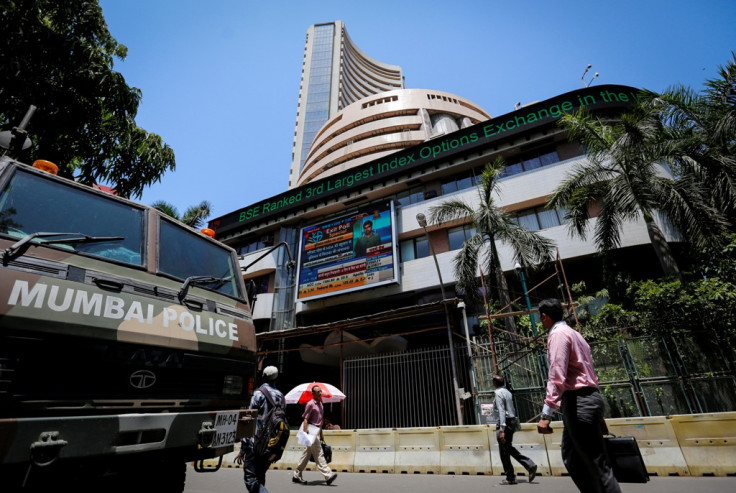Asian markets round-up: Most bourses trade lower amid choppy trade

Asian markets outside India and Australia traded lower on 10 June amid choppy trade.
The Japanese Nikkei finished 0.25%, or 49.94 points, lower at 20,046.36.
The Shanghai Composite finished 0.15%, or 7.50 points, lower at 5,106.04.
Hong Kong's Hang Seng finished 1.12%, or 301.88 points, lower at 26,687.64.
Australia's S&P/ASX 200 finished 0.13%, or 7.30 points, higher at 5,478.60.
South Korea's Kospi Composite finished 0.62%, or 12.71 points, lower at 2,051.32.
India's S&P BSE Sensex finished 1.36%, or 359.25 points, higher at 26,840.50.
Market movements
The Nikkei ended lower as exporters' stocks lost out after the yen hit a two week high against the US dollar, following Bank of Japan (BoJ) governor Haruhiko Kuroda comments, who said the real effective exchange rate shows the Japanese currency as "very weak".
The Shanghai Composite finished a tad lower following US index provider MSCI's decision to defer the inclusion of mainland-traded A-shares on its emerging market index. Investor sentiment was also pulled down after the People's Bank of China (PBoC) said in a report that the central bank's economists had lowered their 2015 growth forecast to 7% from 7.1%.
Chris Weston, IG's chief market strategist said in a note to clients: "The prospect of a pullback remains elevated in the Chinese markets, but given real yields are on the rise, I think we can expect a cut in benchmark interest rate or banks' reserve ratio requirements within the coming weeks, which means pullbacks in mainland markets should be supported."
Elsewhere, the ASX rebounded on the back of comments by Reserve Bank of Australia (RBA) governor Glenn Stevens, who indicated that the central bank was "open to the possibility" of more interest rate cuts if needed.
Meanwhile, the Kospi finished lower amid concerns over the country's Middle East Respiratory Syndrome (MERS) outbreak, with some 108 people reportedly being infected.
The Sensex gained on the back of MSCI's decision to delay enlisting China A-shares on its index.
Capital Economics said in a note to clients: "Indian consumers have struggled in recent months despite the tailwinds of lower inflation and reductions in interest rates. This can be explained in part by continued problems in the labour market and the domestic banking system. With progress in reducing bottlenecks in these areas still slow, household consumption looks set to remain subdued."
Company stocks
In Tokyo, Hino Motors fell 4.25% while rival Isuzu lost 2.87% after Citigroup downgraded the truck-makers' rating to "neutral" from "buy".
In Shanghai, China National Nuclear Power Corporation (CNNPC) soared 44% to 4.880 yuan in its market debut.
China Everbright Bank finished 3.20% lower. Bank of Communications, Bank of China and China Citic Bank lost 2.65%, 2.34% and 2.00% respectively.
In Hong Kong, HSBC shed 0.55%.
In Sydney, Fortescue Metals lost 2.51%.
Retailers JB Hi-Fi, Myer and Havey Norman lost 3.58%, 1.85% and 1.70% respectively after the Westpac-Melbourne Institute consumer sentiment index dropped 6.9% in June from 102.4 to 95.3. A reading above 100 highlights optimism, while a figure below 100 points to pessimism on current economic conditions and respondents' personal finances.
In Seoul, LG Household & Healthcare tanked 5.18%.
Tourism-related stocks dropped post worries that MERS could compel tourists, especially big-buying Chinese tourists, to cancel travel plans.
Hanatour Service lost 2.78% while Hotel Shilla lost 2.31%. Hyundai Department Store and rival Shinsegae lost 3.42% and 2.74% respectively.
However, construction firm Samsung C&T surged 10.29% after a shareholder, US activist hedge fund Elliott, said it was seeking an injunction against the firm to block a proposed $8bn takeover offer from Cheil Industries. Cheil lost 2.19%.
In Mumbai, Reliance Industries added 2.49%.
© Copyright IBTimes 2025. All rights reserved.



















